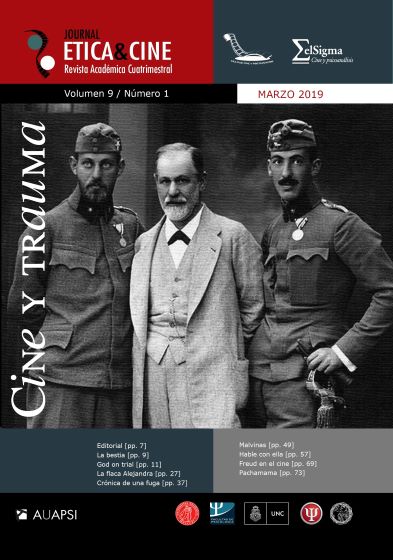What does God want?
DOI:
https://doi.org/10.31056/2250.5415.v9.n1.23890Keywords:
God, Ethic act, Holocaust, TraumaAbstract
A group of jews from different origins are shut-in a barrack of Auschwitz. They are aware that they will be executed in a gas chamber at dawn. Confronting their somber destiny, they wonder why Jehova doesn´t help them. Someone accuse God for having broken the alliance with the jew people. The debate acquires the form of a judjement to God, so as to determine if he is guilty or innocent of betrayal to the Chosen People. God on trial staged the problem of the position of man confronted to horror, cruelty and injustice. But above all to the figure of God, and the varied possible respons –denial, cinical, despare, étical- in the face of it´s absence.
Downloads
References
Agambem, G. (1995). Homo Sacer. El poder soberano y la nuda vida. Torino: Giulio Einaudi editore.
Freud, S. (1990). El porvenir de una ilusión. En Obras Completas, Volumen XXI, Buenos Aires: Amorrortu.
Lacan, J. (2005). Los Nombres-del-padre. Paris: Éd Seuil.
Pakula, A. y Barish, K. (productores) y Pakula, A. (director). (1982). Sophie’s Choice [Cinta cinematográfica]. Reino Unido: Incorporated Television Company y Keith Barish Productions.
Redhead, M.; Rodgers, J.; Mensah, A. (productores) y De Emmony, A. (director). (2008). God on trial [Cinta cinematográfica]. Reino Unido: British Broadcasting Corporation (BBC) y Hat Trick Productions.
Rosenbaum, R. (1999); Explicar a Hitler. Los orígenes de su maldad. México: Siglo XXI.
Sibony, D. (2004). Los tres monoteísmos. Madrid: Síntesis.
Wiesel, E. (1995). The trial of God. New York: Shocken Books.
Downloads
Published
How to Cite
Issue
Section
License
Los autores que publiquen en Ética y Cine Journal aceptan las siguientes condiciones:
Los autores/as conservan los derechos de autor © y permiten la publicación a Ética y Cine Journal, bajo licencia CC BY-SA / Reconocimiento - Reconocimiento-CompartirIgual 4.0 Internacional. La adopción de esta licencia permite copiar, redistribuir, comunicar públicamente la obra, reconociendo los créditos de la misma, y construir sobre el material publicado, debiendo otorgar el crédito apropiado a través de un enlace a la licencia e indicando si se realizaron cambios.

Este obra está bajo una licencia de Creative Commons Reconocimiento-CompartirIgual 4.0 Internacional.




